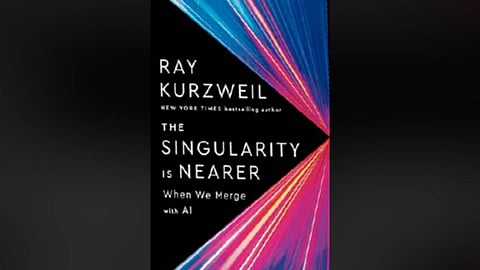

2024 was a fantastic bookish year for me. I completed two bucket list items: speaking at the Jaipur Literature Festival in January and opening an antiquarian bookstore in Bengaluru in November. On the reading front, though I did not read as many books as I would have liked, I read some outstanding ones.
Of the many books on artificial intelligence that I read, Ray Kurzweil’s ‘The Singularity is Nearer’ and Salman Khan’s ‘Brave New Words’ were the most notable. However, I was particularly impressed by the graphic novels ‘Dream Machine’ by Appupen and ‘Artificial’ by Amy Kurzweil. Appupen’s story is about the advent of AI and its implications. Amy’s book, on the other hand, deals with whether we can communicate with the dead using AI.
Other graphic novels that I enjoyed were ‘Stories by Manto: A Graphic Narrative’ and Yuval Harari’s three-part ‘Sapiens: A Graphic History’, a graphic adaptation of the bestseller ‘Sapiens’ by renowned comics artists Daniel Casanave and David Vandermeulen. I have savoured every book by Harari, and the graphic novel is a unique way to make his work more accessible. Stories by Manto is a visually stunning publication where the author’s prolific fiction finds new expression through a fusion of timeless prose and captivating illustrations.
Among the memoirs, I enjoyed Aruna Roy’s ‘Personal is Political’ and Dorsey Nunn’s ‘What Kind of Bird Can’t Fly’. Both are by social activists I know personally and are backed by lifelong activism. Aruna’s memoir is the story of two parallel journeys — a fifty-year engagement with public action in India and a personal narrative that traces how the author has striven to convert her ideological convictions into practice. In Dorsey’s powerful memoir, he links the politics of ‘Black Power’ to the movements for Black lives and dignified reentry.
On the political front, as I was trying to understand the comeback of Trump, I found some answers in the book ‘Stolen Pride’ by Arlie Russell Hochschild. Arlie uncovers the “Pride Paradox” that has turned the children and grandchildren of Roosevelt Democrats into Trump Republicans. This is the best book on the moral and political psychology of the new right, a masterclass in the art of listening across cultural and political divides in America.
The last book I read was the Booker-winner ‘Orbital’ by Samantha Harvey. The story encompasses a single day in the life of six astronauts and cosmonauts aboard the International Space Station. During those 24 hours, they observe 16 sunrises and 16 sunsets over their silent blue planet, spinning past continents and cycling past seasons, taking in glaciers, deserts, mountains and oceans. This compact yet beautifully expansive novel invites us to observe Earth’s splendour while reflecting on the individual and collective value of every human life.
Finally, the two books that are on my reading list are the national award-winning ‘James’ by Percival Everett and ‘Patriot A Memoir’ by Alexei Navalny. James is the reimagining of ‘The Adventures of Huckleberry Finn’ told from the enslaved Jim’s point of view. ‘Patriot’ is Navalny’s memoir that he began writing shortly after his near-fatal poisoning in 2020. It is the full story of his life: his youth, call to activism, marriage and family, commitment to challenging a world superpower determined to silence him, and his total conviction that change cannot be resisted — and will come.
A special mention goes to Aditi Sowmyanarayan, whose book ‘Thus She Rose’ I had the privilege of releasing at IIS2024. It is a family saga set in the breathtaking valley of Pahalgam, combining the beauty of Kashmir with the depth of human emotion. Aditi’s book is a testimony to the fact that autism has not hindered her creativity.
As we enter 2025, here is a question to ponder: How much AI was used to write these books? And will we need to disclose “No AI was used to write”? Furthermore, you who are reading this text, do you exist in the real world, or are you just an artefact in the virtual universe?